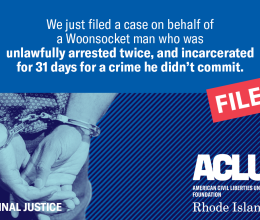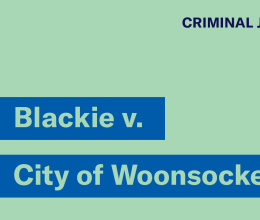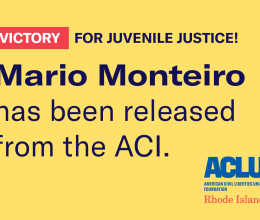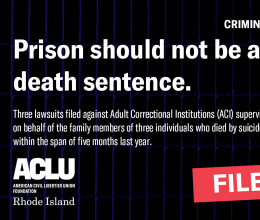The Rhode Island ACLU today filed a federal lawsuit against the R.I. State Police, challenging the legality of the detention and transporting to immigration officials of fourteen people, all Guatemalans, who were stopped in a van on I-95 on July 11th after the driver changed lanes without using a turn signal. The lawsuit, filed by RI ACLU volunteer attorney V. Edward Formisano on behalf of eleven of the individuals, argues that the actions by the state police violated the state’s Racial Profiling Prevention Act, as well as the driver and passengers’ constitutional rights to be free from discrimination and from unreasonable searches and seizures.
The lawsuit notes that the detention ensued even though Thomas Chabot, the state trooper who stopped the van, confirmed that the license and registration of driver Carlos Tamup were valid, and that Tamup had no criminal record. Chabot nonetheless proceeded to open the doors of the vehicle and, by utilizing Tamup as a translator, requested all the passengers to also provide identification. When some did not produce any ID, Chabot asked them if they possessed any documents demonstrating their U.S. citizenship, which none were able to produce. After some further delays, the trooper advised them that they would all be escorted to the Office of Immigration and Customs Enforcement in Providence. According to the complaint, Chabot instructed Tamup that if any passenger attempted to escape from the van en route to Providence, that passenger would be shot.
The suit argues that the defendants “knew or should have known that the search, seizure and detention of the Plaintiffs were without reasonable or probable cause and were therefore unlawful under the circumstances.” The suit seeks a declaratory judgment that the defendants violated the constitutional rights of the driver and passengers, and an award of damages and attorneys’ fees. Last month, the ACLU filed a separate open records lawsuit against the State Police, because the agency has refused to release copies of its traffic enforcement policies or the videotape of that portion of the van stop that was recorded on the police cruiser’s camera.
The van stop has generated significant controversy in the civil rights community. In September, more than a dozen organizations sharply criticized State Police Superintendent Steven Pare’s response to the incident, in which he rejected any suggestion of racial profiling, and instead claimed that the police “acted professionally and appropriately” in conducting the stop. Among other things, the groups noted that Pare never explained why the trooper, who was on speed radar patrol, chose to leave his post to pull over the driver, whose only infraction was failing to use a turn signal, not speeding; or why the trooper demanded identification, as well as citizenship papers, from the passengers when there was no suspicion of criminal activity.
The civil rights groups also noted that Pare’s support of the trooper’s actions in calling immigration officials came less than a month after a state police representative misleadingly told a large community forum that the State Police do not seek to enforce immigration laws. The groups have further claimed that Pare’s approval of the detention has encouraged a “chill” in the Latino community, where residents are fearful of contacting the police to report crimes lest their own immigration status be investigated.
RI ACLU executive director Steven Brown said today: “Since the license and registration papers of the van’s driver were valid and there was never any suggestion of criminal activity, the questioning and detention of the passengers was clearly based on one element: their ethnic appearance. This is the essence of racial profiling. That State Police officials have unequivocally supported these actions demonstrates the need for legislation to restrict these problematic law enforcement practices.” Last week, the RI ACLU issued a detailed report calling for such legislation after documenting the continuing problem of racial profiling on the state’s highways.








